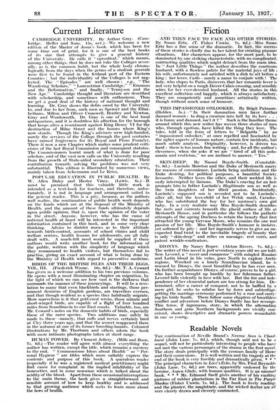Current Literature
CAMBRIDGE UNIVERSITY. By Arthur Gray. (Cam- bridge. Heifer and Sons. 15s. net.)—We welcome a new edition of the Master of Jesus's book, which has been for some time out of print, for it is one of the best books of its size that attempts to give a general history of the University. He calls it episodical," which means, among other things, that he does not take the Colleges sever- ally, as is the common habit, but the whole body chrono- logically from the days when the germs of a studiurn generale were first to be found in the fenland port of the Eastern Counties : but the individuality of the Colleges is not neg- lected. The' Episodes " are well chosen ; e.g., " The WanderingScholars," " Lancastrian Cambridge," Erasmus and the ReforMation," and finally, " Tennyson and the New Age.". Cambridge thought and literature are described with scholarship, and . sometimes with enthusiasm. Thus we get a good deal of the history of national thought and learning. Dr. Gray shows the debts -owed by the University to, and due to her from, such men as Spenser and the Eliza- bethans, Milton and Oliver Cromwell, Bentley and Newton, Gray and Wordsworth. Dr. Gray is- one of the best local antiquarians, and it is doubtless his affection for the borough that keeps alive a resentment against King Henry VI for the destruction of Milne Street and the houses where King's now stands. Though the King's advisers were high-handed, surely the services of the College through the past centuries have earned forgiveneks for its Royal and Pious Founder. There is' now a new Chapter which makes some prudent criti- cisms of the last Royal Commission and consequent statutes. The Commissioners learnt much of what is done for poor scholars, and of the vast new calls on the University resulting from the growth of State-aided secondary education. Their contribution towards solving the problems was not very substantial. This edition is illustrated by numerous views, mainly taken from Ackermann and Le Keux.


































 Previous page
Previous page